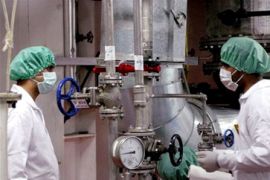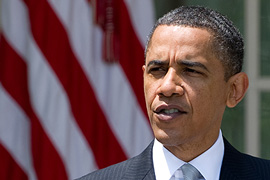Iran’s unanswered questions
Analysts question whether nuclear swap deal is viable or serious.

 |
| The White House warned Monday that Iran still faces the threat of sanctions [AFP] |
News of an Iranian nuclear fuel swap dealhas been greeted in Washington, and in European capitals, with a great deal of scepticism.
The White House warned that Iran still faces the threatof economic sanctions, while the EU said it still has “serious concerns” about Iran’s nuclear programme.
Why the lingering doubts? Because the short declaration announcing the deal leaves out a number of key details, according to analysts and nuclear experts.
“The deal itself is supposed to be a confidence-building measure, in the short-term, a step towards broader negotiations to resolve the nuclear standoff,” Peter Crail, a non-proliferation analyst at the Arms Control Association, said.
“But the way it’s done now raises questions about whether Iran is serious.”
The deal signed on Monday would send 1,200kg of Iran’s low-enriched uranium (LEU) to Turkey, where it will be held in a sort of “escrow”.
But it makes no mention of the uranium that Iran will not ship overseas.
Uranium enrichment
Mahmoud Ahmadinejad, the Iranian president, claimed in February that Iran had successfully enriched uraniumup to 20 per cent.
There was some debateabout whether Ahmadinejad was telling the truth – but analysts now believe Iran has been producing small quantities of highly-enriched uranium.
That work seems set to continue after the fuel swap.
Ramin Mehmanparast, Iran’s foreign ministry spokesman, said on Monday that Iran would continue to enrich its remaining stockpileof low-enriched uranium.
“If Iran maintains that position, then I think this deal is not going anywhere,” Crail said.
Continued enrichment is a particular concern for the West because – even after the swap – Iran will be close to the level of LEU required to produce a nuclear weapon.
When the IAEA first proposed a 1,200kg fuel swap, in October, Iran was believed to have about 1,800kg of uranium.
The swap would have removed two-thirds of its stockpile, thus taking away Iran’s “breakout capacity” – its ability to quickly refine enough uranium for a nuclear weapon.
But now the Iranian stockpile is estimated at 2,200kg or 2,300kg, according to analysts, possibly leaving Iran with nearly enough fuel after the swap to produce a nuclear weapon.
Turkey’s technology
The escrow arrangement is unlikely to prompt many concerns from the US and EU.
Obama administration officials have said before that they are willing to accept a swap brokered through Turkey, and Philip Maxon, an analyst at the Washington-based New America Foundation, notes that the fuel will be kept under International Atomic Energy Agency safeguards.
 |
| Iran says it will continue to enrich uranium, regardless of the swap deal [AFP] |
But Turkey does not have the capacity to fulfil the other part of the fuel swap, which would see 120kg of highly-enriched uranium sent to Iran, where it will be used in a research reactor in Tehran.
Turkey cannot produce those fuel rods, so they would be manufactured by a third country. Analysts say France would probably do the enrichment, using Russian material.
The agreement will need Western support, in other words, or it is simply a deal between three countries which lack the capacity to enact it.
Neither France nor Russia have commented on their willingness to implement the fuel swap.
It is also unclear whether Turkey will be required to return the Iranian LEU after the fuel swap is complete, or whether it will remain under IAEA safeguard in Turkey.
Brazil and Turkey are both non-permanent members of the United Nations Security Council, so their support for this agreement is a short-term obstacle to an economic sanctions package.
“Since Brazil and Turkey are on the Security Council, [it] pretty much kills any sanctions for a while,” Maxon said.
But the cool reaction from the West means any delay to the US-led push for further sanctions will perhaps be temporary at best.